Why this resume works
- Quantifies accomplishments: The resume quantifies accomplishments using specific metrics, such as improving client satisfaction by 15% and managing medications with 98% accuracy, demonstrating the candidate’s tangible impact.
- Showcases career progression: The chronological resume format highlights the job seeker’s career progressions from providing daily care to developing personalized care plans and managing multiple clients simultaneously.
- Uses action-oriented language: Action verbs such as “assisted,” “managed,” and “improved” clearly illustrate the job seeker’s proactive approach to caregiving tasks.
More Caregiver Resume Examples
Explore our caregiver resume examples to showcase your compassion, experience, and essential caregiving skills. These samples and our nursing resume examples can help you create a resume that highlights your dedication and suitability for caregiving roles.
Entry-Level Caregiver
Why this resume works
- Features a strong education section: The education section showcases relevant degrees that emphasize the job seeker’s strong academic background in healthcare, which is crucial for early career impact.
- Touches on accomplishments: Includes accomplishments like reducing patient falls by 25%, highlighting the job seeker’s exceptional performance and contributions in caregiving roles.
- Includes in-demand skills: Showcases the job seeker’s ability to create organized and detailed care plans, reflecting strong nursing skills and readiness for modern workplace demands.
Mid-Level Caregiver
Why this resume works
- Hones in on real impact: Showcases impact by detailing achievements like reducing hospital readmissions by 15% and improving patient mobility by 20%, directly showcasing tangible benefits to employers.
- Includes a mix of soft and hard skills: Blends soft skills, such as patient communication, with hard skills, including medication management, highlighting a well-rounded capability essential for caregiving roles.
- Displays technical expertise: Technical expertise is evident through certifications like Certified Nursing Assistant and Home Health Aide, along with specific accomplishments in tracking systems and care plan adherence.
Experienced Caregiver
Why this resume works
- Lists relevant certifications: By listing certifications like Certified Caregiver and CPR, this resume emphasizes the job seeker’s commitment to expertise and continuous learning in patient care.
- Showcases impressive accomplishments: Achievements such as reducing patient incidents by 25% and boosting mobility by 20% reflect a significant positive impact on patient well-being and operational efficiency.
- Focuses on work history: The chronological work history format highlights a progressive career in caregiving, perfectly illustrating extensive experience and growth over time.
Caregiver Resume Template (Text Version)
Jin Martinez
Austin, TX 78707
(555)555-5555
Jin.Martinez@example.com
Professional Summary
Dedicated caregiver with 7 years of experience enhancing client well-being. Skilled in patient care, health monitoring, and medication management. Known for improving client satisfaction and maintaining high standards of care.
Work History
Caregiver
CareWell Home Services – Austin, TX
June 2022 – March 2025
- Assisted 10+ clients with daily care tasks
- Managed client medications with 98% accuracy
- Improved client satisfaction scores by 15%
Personal Care Assistant
Serenity Care Solutions – Houston, TX
June 2018 – May 2022
- Delivered personal support to 8 elderly clients
- Monitored health and well-being of clients
- Developed personalized care plans for each client
Home Health Aide
BrightPath Caregiving – Dallas, TX
June 2016 – May 2018
- Provided in-home care to 5 patients daily
- Achieved a high level of client trust and rapport
- Assisted in mobility and physical therapy exercises
Skills
- Patient Care
- Medication Management
- Health Monitoring
- Personal Care Assistance
- Effective Communication
- Client Relationship Building
- Empathy
- Time Management
Education
Master of Science Nursing
University of California, Los Angeles Los Angeles, California
June 2016
Bachelor of Science Health Sciences
University of California, Berkeley Berkeley, California
June 2014
Certifications
- Certified Nursing Assistant (CNA) – California Board of Nursing
- CPR and First Aid – American Red Cross
Languages
- English – Beginner (A1)
- Spanish – Bilingual or Proficient (C2)
- French – Intermediate (B1)
Popular Skills for a Caregiver Resume
A well-crafted resume skills section is essential for highlighting the technical abilities and personal qualities required to thrive as a caregiver.
Balancing hard skills like first aid and patient care with soft skills such as empathy and communication ensures you are perceived as a well-rounded candidate for this important role.
Below are a few of the top soft skills frequently listed on caregiver resumes.
| Soft Skills | % of resumes with this skill |
|---|---|
| Time management | 89.47% |
| Compassion | 76.19% |
| Problem-solving | 70.00% |
| Patient care | 45.71% |
| Dependability | 41.27% |
Here are a few examples of hard skills frequently included on caregiver resumes.
| Hard Skills | % of resumes with this skill |
|---|---|
| Elderly care | 75.00% |
| First aid and safety | 31.96% |
| Meal preparation | 28.46% |
| Dementia care | 26.83% |
| Basic housekeeping | 26.70% |
Related Resume Guides
- Hemodialysis Nurse
- Intensive Care Nurse
- Labor And Delivery Nurse
- Licensed Practical Nurse
- NICU Nurse
- Nurse Practitioner
- Nursing Aide And Assistant
- Nursing Assistant
- Nursing Unit Clerk
- OB Gyn Nurse
- Oncology Nurse
- Operating Room Nurse
- Patient Care Associate
- Patient Care Technician
- Pediatric Nurse
- Perioperative Nurse
- Pre Post Operating Nurse
- Private Duty Nurse
- Public School Nurse
- Registered Nurse
- Shift Coordinator
- Trauma Nurse
Advice for Writing Your Caregiver Resume
Explore our expert tips on how to write a resume for a caregiver position and discover how to highlight your compassion, experience, and dedication to providing exceptional care.
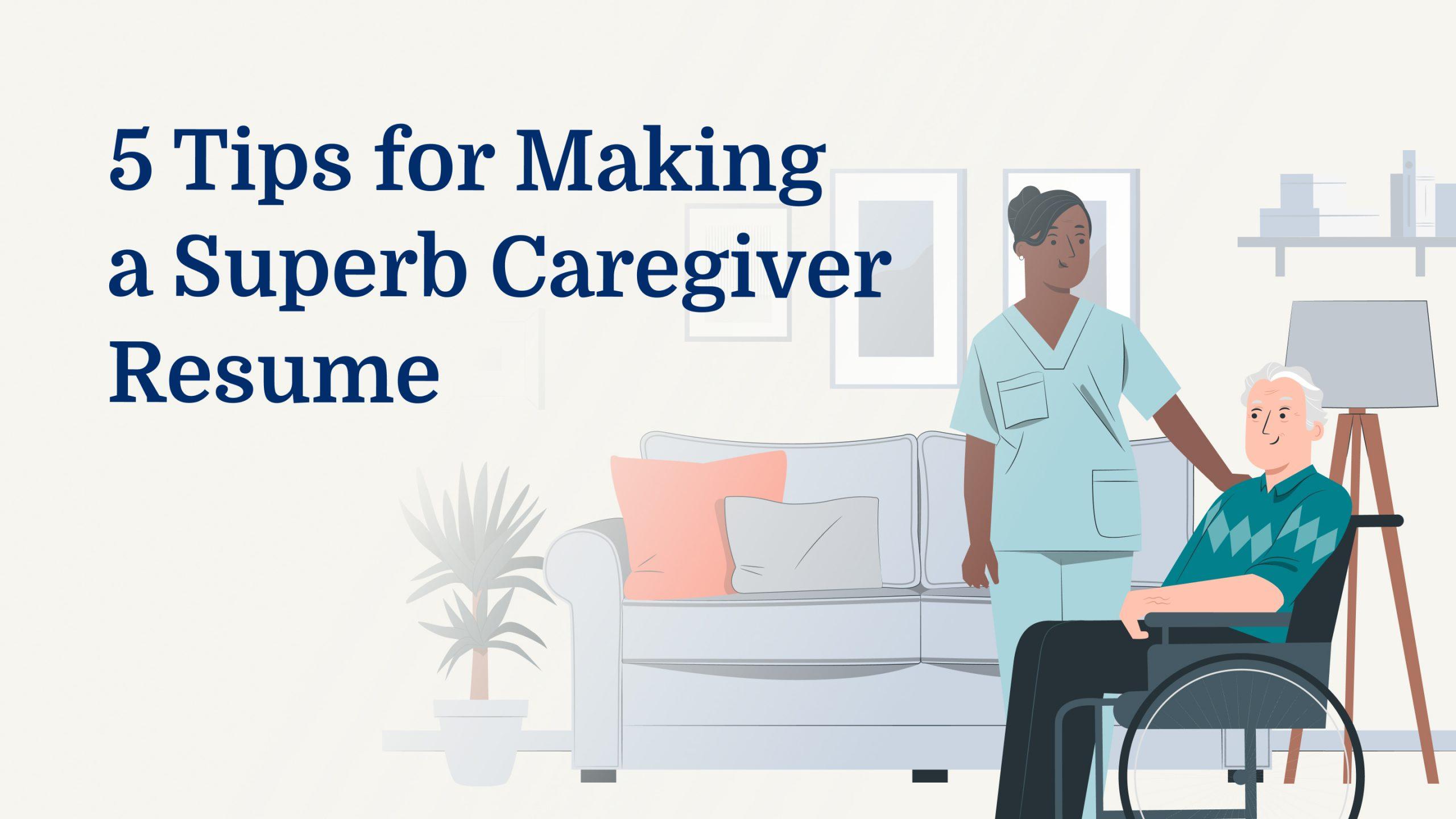
Write a strong professional summary
A professional summary provides a concise introduction at the beginning of your resume, offering hiring managers a snapshot of your skills and experiences. For an experienced caregiver, it emphasizes years of hands-on expertise, unique skills, and significant accomplishments.
Conversely, a resume objective is ideal for entry-level candidates with limited work experience; it focuses on career aspirations and what you aim to achieve in the role.
Use strong action verbs in your summary to highlight your impact. Include specific skills such as patient care, medication management, or emotional support.
Emphasize relevant achievements, such as enhancing patients’ well-being or efficiently managing multiple cases. Structure your summary logically, beginning with your strongest points, to make a compelling first impression that can distinguish you from other candidates.
Caregiver resume summary examples
Entry-level
Compassionate and dedicated recent graduate with a certificate in caregiving and CPR/First Aid certification. Experienced in providing basic care, assistance with daily activities, and companionship to elderly patients during clinical training. Skilled in patient communication, maintaining a clean environment, and supporting emotional well-being. Eager to contribute to a caregiving team and enhance the quality of life for those in need.
Mid-career
Experienced caregiver with over 5 years of experience assisting elderly and disabled individuals with daily living activities. Proficient in medication management, meal preparation, mobility assistance, and personal hygiene support. Certified Nursing Assistant (CNA) with a track record of building strong relationships with clients and their families. Recognized for reliability, empathy, and dedication to providing high-quality care.
Experienced
Highly skilled caregiver with more than 15 years of experience working in both private home care settings and assisted living facilities. Expertise in managing complex health conditions, coordinating care plans with healthcare professionals, and providing specialized support for dementia patients. Certified Dementia Practitioner (CDP) known for leadership abilities, advanced patient care techniques, and improving client outcomes through personalized care strategies.
Caregiver resume objective examples
Recent graduate
Compassionate and dedicated recent graduate with a certificate in caregiving seeking an entry-level caregiver position. Eager to apply my knowledge of elderly care, first aid, and daily living assistance to improve the quality of life for clients. Committed to providing empathetic and patient-focused support in a reputable healthcare facility.
Career changer
Motivated professional transitioning into the caregiving field, bringing strong interpersonal and organizational skills from a background in customer service. Seeking an opportunity to leverage my passion for helping others and newly acquired caregiving training to provide exceptional care and companionship to those in need.
Specialized training
Certified nursing assistant (CNA) with specialized training in dementia care seeking an entry-level caregiver role. Enthusiastic about utilizing my certifications and hands-on experience from clinical rotations to deliver compassionate care tailored to the unique needs of individuals with cognitive impairments.
Our Resume Builder helps you easily create a professional caregiver resume, highlighting your best skills and experiences.
Include relevant certifications and training
Creating a dedicated certifications section on your resume is crucial, especially for a caregiver. Listing certifications, licenses, and specialized training shows employers that you have the necessary skills and knowledge for the job.
Including certifications on your resume also sets you apart from other candidates who may not have these credentials. To complete this section effectively, list each certification with its full name, the issuing organization, and the date you received it.
By organizing your certifications clearly and prominently, you make it easy for potential employers to see your qualifications at a glance. This can greatly improve your chances of landing the caregiver role you want.
Example of a certifications section
Certified Nursing Assistant (CNA)
Issued by: American Red Cross
Issued 2022
Basic Life Support (BLS)
Issued by: American Heart Association
Expires 2024
First Aid Certification
Issued by: National Safety Council
Issued 2023
CPR Certification
Issued by: American Heart Association
Expires 2025
Medication Aide Certification (MAC)
Issued by: National Association of Medication Aide Regulators (NAMAR)
Issued 2021
We recommend using one of our professional resume templates to ensure your resume effectively highlights your skills and experience.
Showcase your work experience
Displaying relevant work experience on a caregiver resume is essential to demonstrate you have the skills and expertise required for the role. Arrange your work experience chronologically, beginning with your latest position. Provide the job title, employer name, location, and employment dates.
List your responsibilities and achievements using bullet points, starting each one with an action verb. Include core duties like assisting with daily living activities (ADLs), providing companionship, managing medications, monitoring health conditions, and effectively communicating with healthcare professionals.
Highlighting these abilities will show employers that you can deliver high-quality care. Keep your descriptions clear and concise while emphasizing your contributions in each role.
5 caregiver work history bullet points
- Provided personalized care to 10+ elderly clients, improving their quality of life and ensuring 95% client satisfaction.
- Administered medications and managed health schedules, resulting in a 20% reduction in missed doses.
- Assisted clients with daily living activities such as bathing, dressing, and meal preparation, enhancing their independence by 40%.
- Developed and implemented individualized care plans for each client, tailoring services to meet unique needs and achieving a 30% improvement in overall health outcomes.
- Collaborated with healthcare professionals to monitor patient conditions and adjust care strategies, contributing to a 25% decrease in hospital readmissions.
Use keywords from the job posting to pass ATS and catch recruiters’ eyes, making your resume shine.
Match your resume with the job description
Tailoring your resume to match job descriptions is crucial because it helps you stand out to employers and increases your chances with Applicant Tracking Systems (ATS). Many companies use ATS to screen resumes, and these systems search for specific keywords.
By including the right words from the job posting, your ATS-friendly resume is more likely to be noticed by a hiring manager.
Start by identifying key words and phrases in the caregiver job description. Look for skills, qualifications, and duties mentioned multiple times. Common terms might include “assisting with daily activities,” “medication management,” or “providing emotional support.”
Then, incorporate these terms into your resume. For example, if the job description says, “Assist clients with personal care needs,” you can reword this into a bullet point like “Assisted clients with daily personal care tasks, ensuring comfort and safety.”
This ensures that your resume matches what the employer is looking for. When listing skills, use headings like “Key Skills” or “Core Competencies” and mention specific abilities such as “patient care,” “mobility assistance,” or “empathy.”
Highlight achievements by quantifying them where possible; for instance, “Implemented a new routine that improved client satisfaction by 30%.”
Organize sections clearly so hiring managers can quickly find relevant information. To increase your chances further, make sure to customize your resume according to each job application.
Make sure your resume gets noticed! Use our ATS Resume Checker to find and fix mistakes, add important keywords, and improve the format before you send it out.
FAQ
Do I need to include a cover letter with my caregiver resume?
Even if not explicitly required, including a caregiver cover letter with your resume allows you to showcase your passion for caregiving and highlight the specific skills and experiences that make you an ideal candidate.
You can include personal anecdotes or examples demonstrating your compassion, patience, and dedication — key qualities in this field.
If you have special training or certifications relevant to caregiving, your cover letter is an excellent place to mention them.
It also provides an opportunity to explain any employment gaps or unique situations that might be unclear from your resume alone.
Using resources like our Cover Letter Generator and reviewing cover letter examples can help you create a well-crafted cover letter that make a strong first impression.
How long should a caregiver’s resume be?
The ideal resume length for a caregiver resume is one page, which allows hiring managers to quickly recognize your pertinent skills and experience.
Concentrate on emphasizing your caregiving responsibilities, certifications, and any specialized training undertaken.
If you have extensive experience or additional relevant qualifications, a two-page resume is acceptable; however, ensure only the most critical information is included.
How do you write a caregiver resume with no experience?
Follow the tips below if you are writing a resume without experience for your first caregiver role:
- Begin with a compelling objective statement that showcases your passion for caregiving and eagerness to learn. For example, “Compassionate individual seeking a caregiver position to leverage strong interpersonal skills and dedication to providing exceptional care.”
- Underscore any volunteer work or personal experiences where you provided care for family members or friends. Detail activities such as assisting with daily routines, offering companionship, or managing medications.
- Highlight essential interpersonal skills like patience, empathy, communication, and problem-solving abilities. These traits are vital for caregivers and can distinguish you even without formal experience.
- Include any pertinent certifications or training like CPR or First Aid. If you haven’t obtained these yet, consider doing so — they can greatly enhance your resume.
If applicable, mention related work experiences such as babysitting, customer service, or housekeeping positions. These roles illustrate your responsibility and ability to handle diverse tasks effectively.
Rate this article
Caregiver
Additional Resources

Entry-Level Healthcare Administrator Resume Examples & Templates
See how our healthcare support administrator resume examples can help you create a strong resume. Get tips on showcasing your administrative skills, healthcare experience, and ability to keep medical offices
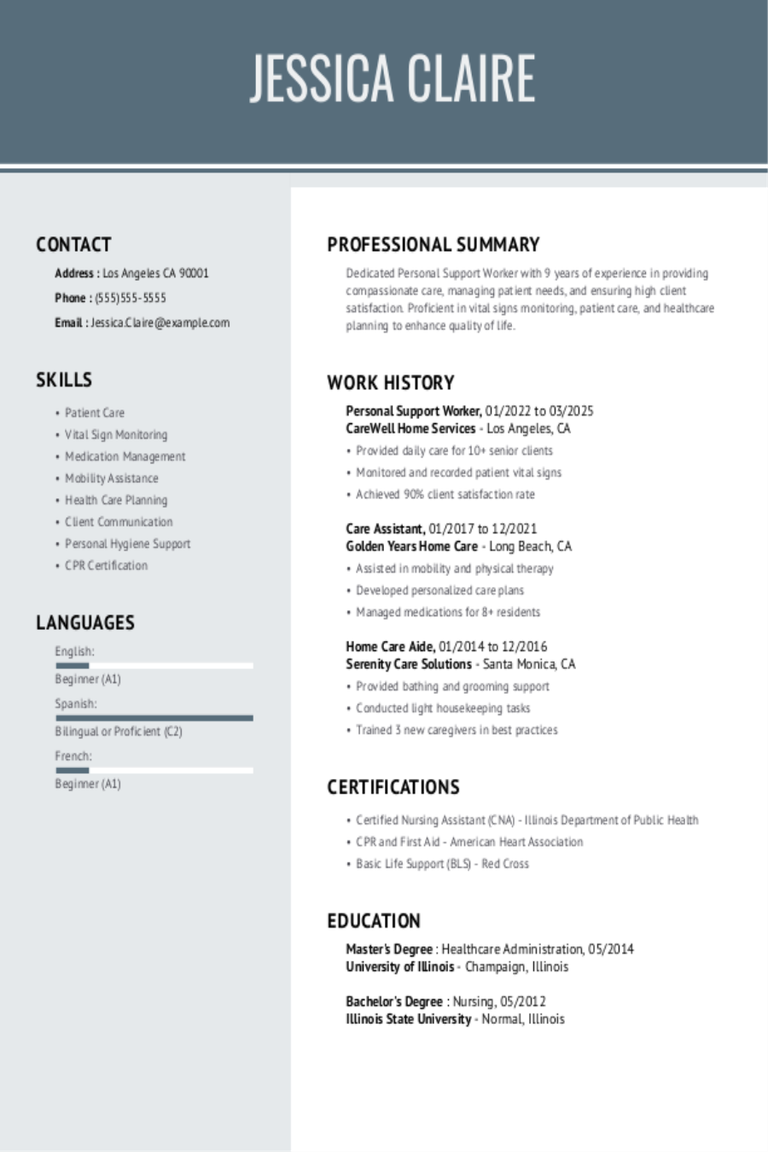
Personal Support Worker Resume Examples & Templates
Explore personal support worker resume examples to see how to highlight hands-on caregiving experience, certifications, and essential skills like compassion and reliability on your resume.Build my resumeImport existing resumeCustomize this
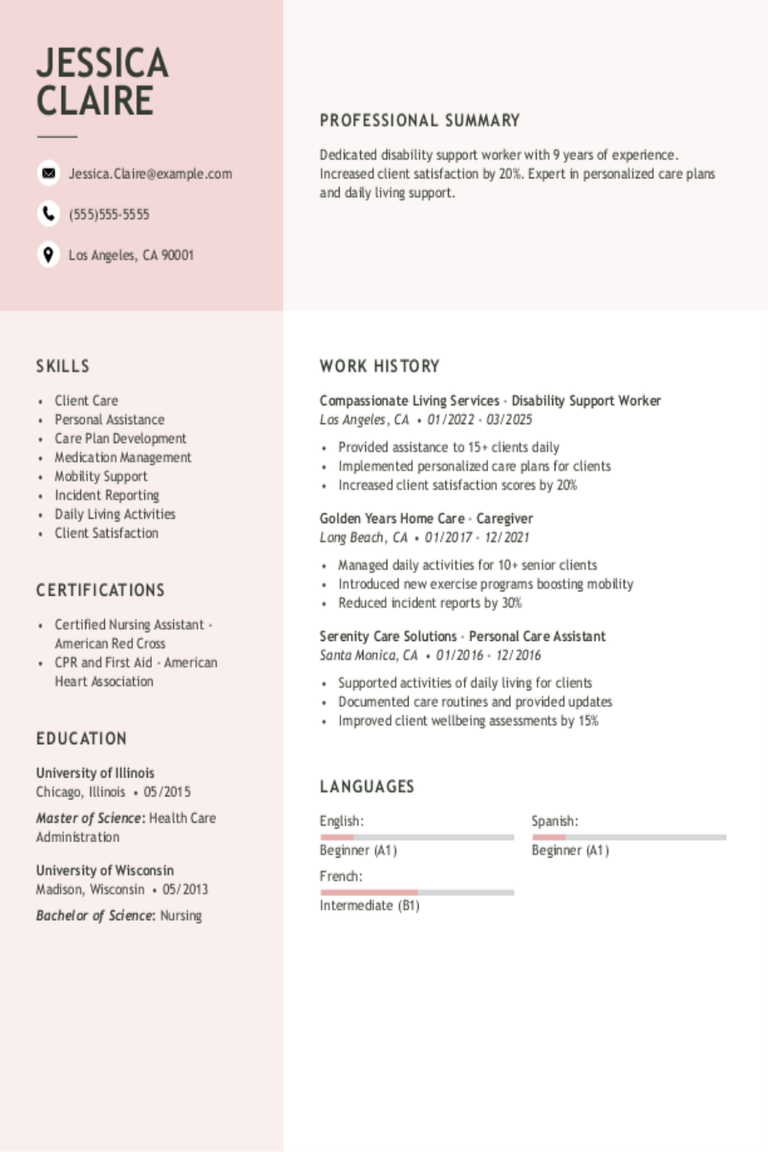
Disability Support Worker Resume Examples & Templates
These disability support worker resume examples show you how to showcase your experience with clients with diverse disabilities and your person-centered support skills in the best way possible.Build my resumeImport
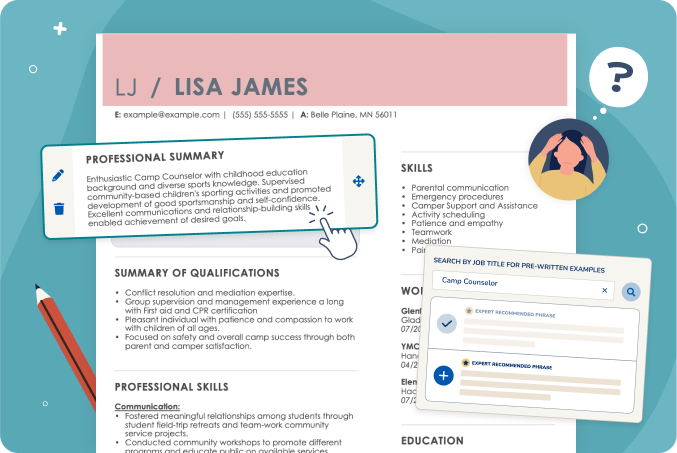
How to Write a Resume (Examples & Guide)
Did you know that 40% of hiring managers spend less than a minute reviewing a resume? That means you have only seconds to make a strong impression. Your resume needs to
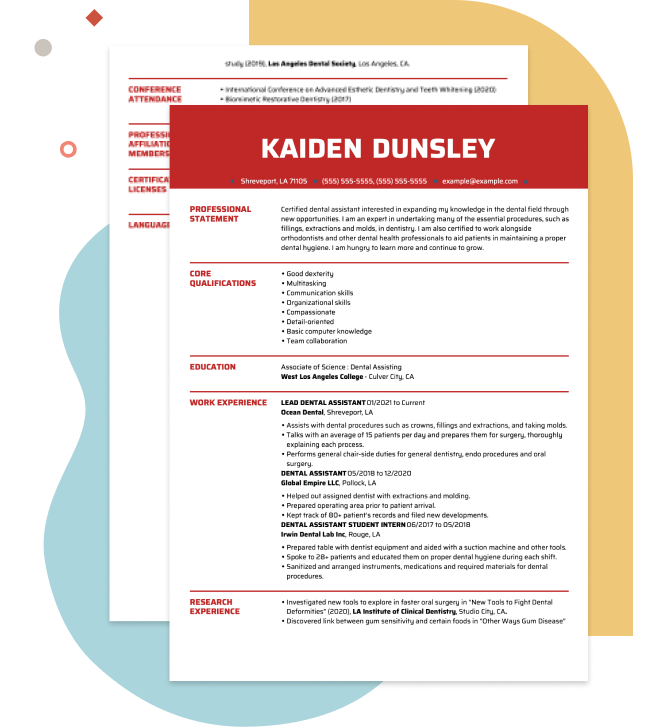
Geriatric Nurse Practitioner Resume Examples & Templates
A geriatric nurse practitioner is a registered nurse with additional training and certification in geriatrics. Geriatric nurse practitioners provide advanced primary care to older adults, typically 65 years and above.

Preschool Teacher Guide + Tips + Example
Kick-start and advance your preschool teacher career with a professional resume. We have the best guide to build your preschool teacher resume. Take advantage of our tips on skills you
